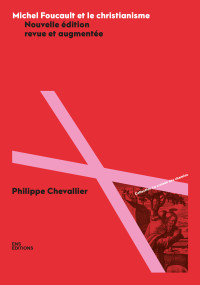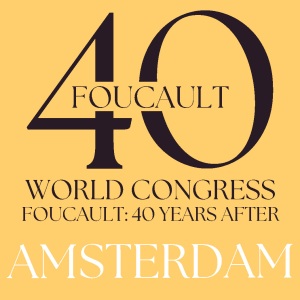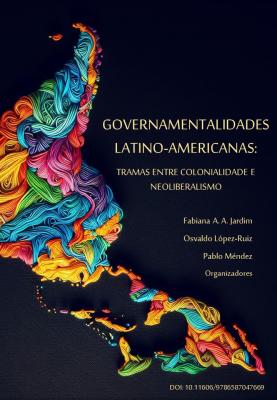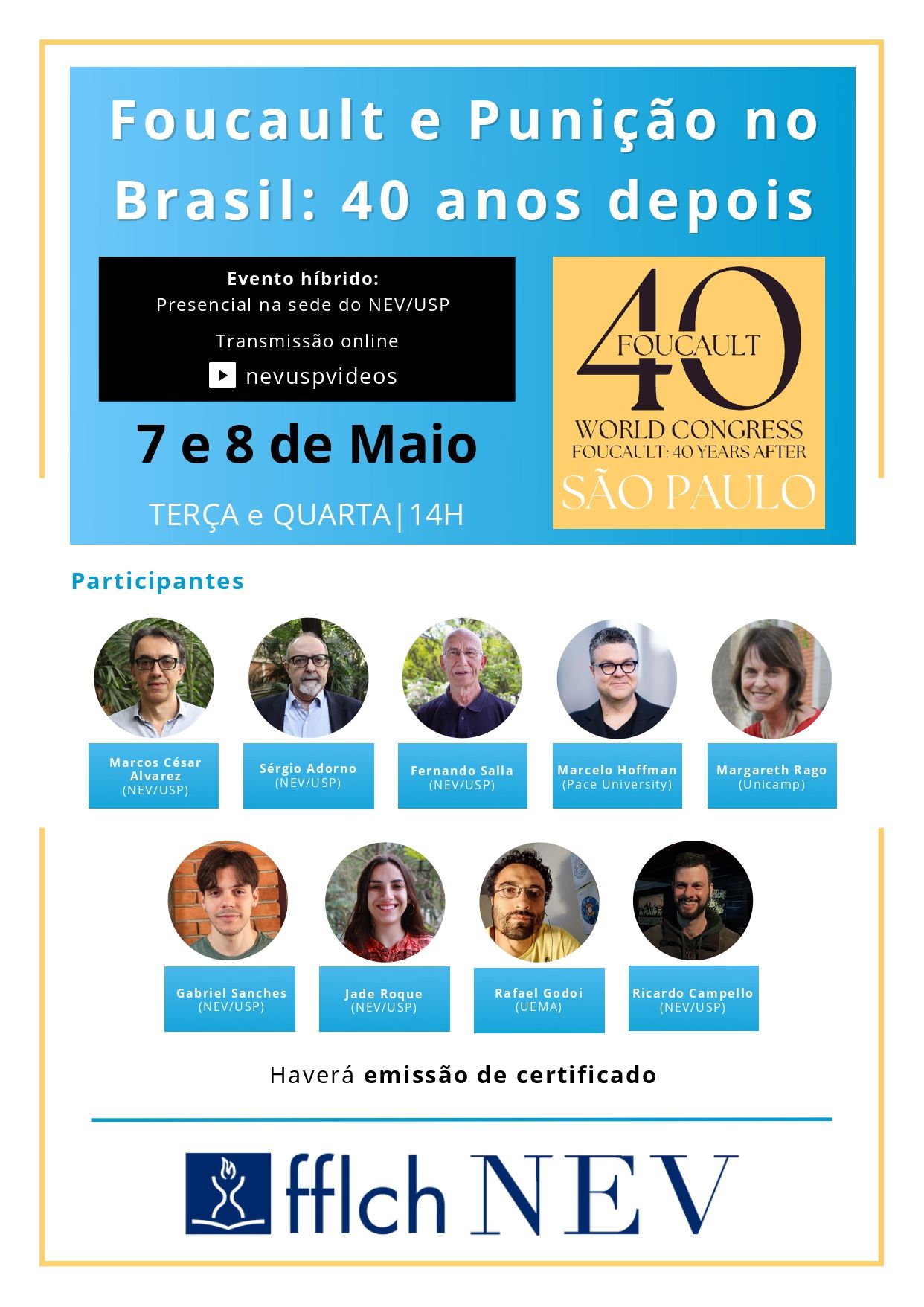There will be transmissions online during both days at the following addresses:
7th May: https://www.youtube.com/watch?v=CmAod0zJYzg
8th May: https://www.youtube.com/watch?v=R5d9tqvIg-Q
 Chevallier, Philippe. Michel Foucault et le christianisme. Lyon: ENS Éditions, 2024.
Chevallier, Philippe. Michel Foucault et le christianisme. Lyon: ENS Éditions, 2024.
https://doi.org/10.4000/books.enseditions.47769.
Des rites antiques à la confession moderne, le christianisme fut pour Foucault une interrogation constante, aiguillée par notre actualité : quel destin cette religion a-t-elle eu dans nos vies, dans la manière de nous conduire, de connaître notre désir, de chercher notre salut ? Ce livre propose la première synthèse de l’ensemble des lectures chrétiennes de Foucault, d’Histoire de la folie au grand livre posthume Les aveux de la chair, enrichie par la consultation de ses archives. Ecartant les conclusions hâtives, ce parcours épouse la logique d’un travail que Foucault voulut autant historique que philosophique : une certaine manière de lire les textes anciens et d’inciser notre passé. Loin des lieux communs d’un christianisme ascétique et intransigeant, Foucault définit l’originalité chrétienne comme la reconnaissance d’un rapport précaire à la vérité.
Initialement publié en 2011, cet ouvrage pionnier bénéficie d’une mise à jour intégrale, qui tient compte des découvertes les plus récentes que permet l’archive.
« Cette enquête remarquable nous offre l’aperçu le plus complet et le mieux informé d’un nouveau terrain de recherche. Toute personne intéressée par l’œuvre de Foucault doit le lire. » (Colin Gordon, Foucault News)
Le texte seul est utilisable sous licence Licence OpenEdition Books. Les autres éléments (illustrations, fichiers annexes importés) sont « Tous droits réservés », sauf mention contraire.
English
From ancient rites to modern confession, Christianity involved – for Foucault – a constant questioning prompted by our present reality: what influence has this religion had in our lives, in how we conduct ourselves, in how we come to know our desire, in seeking our salvation? Published in 2011, Michel Foucault and Christianity is to this day the only critical synthesis of all of Foucault’s readings of Christianity, from his early work History of Madness (1961) to his last 1984 interviews. This brand-new edition integrates into its analyses the previously unpublished Confessions of the Flesh (2021), and through first-hand consultation of Foucault’s archives, Philippe Chevallier retraces the long, complex, and hitherto unknown editorial odyssey of Confessions of the Flesh (1976-1984). Rejecting hasty conclusions, this journey seizes the logic of a research Foucault intended to be as much historical as philosophical. Far from caricaturing Christianity as ascetic and intransigent, Foucault sees emerge in Christian texts and practices a vital recognition of our precarious relationship with truth.
“Philippe Chevallier’s major survey offers us the most informed and complete picture of the new terrain available to us. Everyone interested in Foucault should have access to it.” (Colin Gordon, Foucault News)
Michel Foucault, bibliographie
Introduction
Première partie – Le christianisme comme objet historique, une question de méthode
Introduction à la première partie
Chapitre un
Définition du modèle stratégique
Chapitre deux
Le christianisme au risque de l’analyse stratégique
Chapitre trois
Foucault et l’historiographie de l’Antiquité tardive
Deuxième partie – Une lecture singulière des Pères
Introduction à la deuxième partie
Chapitre quatre
Le christianisme dans le texte
Chapitre cinq
Conséquences sur l’usage des textes : traduire les Pères
Chapitre six
Vers une « anarchéologie » du christianisme
Troisième partie – Une interprétation du christianisme comme voie moyenne
Introduction à la troisième partie
Chapitre sept
Le christianisme comme Orient perdu
Chapitre huit
La relève d’un temps précaire
Chapitre neuf
Les Aveux, enfin
Conclusion
Annexe
Tables des matières des différentes versions des Aveux de la chair dans l’archive
Bibliographie sélective
Index des noms
 Hagenmüller, M.
Hagenmüller, M.
Images of control and submission in old kingdom funerary iconography: The Egyptian Tomb as a ‘Disciplinary Institution’
(2023) Compulsion and Control in Ancient Egypt: Proceedings of the Third Lady Wallis Budge Egyptology Symposium Edited by Alexandre Loktionov, Archaeopress, pp. 148-160.
Abstract
I argue that funerary scenes can be studied as what Michel Foucault called ‘disciplinary institutions’. They aimed at showing the audience, not only an ideal version of the world, but also a social order where everything revolves around the owner, and where one has to comply with the social position that has been prescribed for him. Thus, they contain an ideological discourse, whose aim is to praise control and submission as fair values. I have chosen to focus on two specific patterns: rendering of accounts, when the scribes check the workers’ accounts, and punishments. My study is limited to Old Kingdom tombs. © the individual authors and Archaeopress 2023. All rights reserved.
Author Keywords
Discipline; Iconography; Old Kingdom tombs; Rendering of accounts; Violence
Nikidehaghani, M.
Accounting and neoliberal responsibilisation: a case study on the Australian National Disability Insurance Scheme
(2023) Accounting, Auditing and Accountability Journal, .
DOI: 10.1108/AAAJ-01-2023-6250
Abstract
Purpose: This paper aims to explore how accounting is fostering neoliberal citizenship through the participants of Australia’s National Disability Insurance Scheme (NDIS). More specifically, this paper aims to understand how accounting discourse and the management accounting technique of budgeting, when intertwined with automated administrative processes of the NDIS, are giving rise to a pastoral form of power that directs people’s behaviour toward certain ends.
Design/methodology/approach: Publicly available data has been crafted into an autoethnographic case study of one fictitious person’s experiences with the NDIS – Mina. Mina is an amalgam created from material submitted to the Joint Parliamentary Standing Committee on the NDIS. Mina’s experiences are then analysed through the lens of Foucault’s concept of pastoral power to explore how accounting has contributed to marketising and digitising public disability services.
Findings: Accounting rhetoric appears to be a central part of rationalising the decision to shift to individualised disability funding. Those receiving payments are treated as self-governable, financially responsible subjects and are therefore expected to have knowledge of management accounting techniques and budgeting. However, NDIS’s strong reliance on the accounting concepts of funds, budgets, cost and price is limiting people’s autonomy and subjecting them to intervention and control.
Originality/value: This paper addresses calls to explore the interplay between accounting and current disability policies. The analysis shows that incorporating accounting into the NDIS’s algorithms serves to conceal the underlying ideology of the programs, subtly driving behaviours towards neoliberal objectives. Further, this research extends the Foucauldian accounting literature by revealing the contribution of accounting to reinforcing the authority of digital pastors in contemporary times. © 2023, Emerald Publishing Limited.
Author Keywords
Autoethnography; Automated disability services; Digitisation; Foucault’s pastoral power; NDIS; Neoliberalism
Rossi, A.
Techniques of Finitude: On the Pastoral Matrix of Economic Care
(2023) Theory, Culture and Society
DOI: 10.1177/02632764231203567
Abstract
Building and expanding on Foucault’s work, this essay interprets pastoral power as a turning point within the long-term history of the care of the self. Through an analysis of early Christian monasticism, it claims that the pastorate emerged out of a re-conceptualization of ancient understandings of human finitude and a correlative transformation of the techniques revolving around it. Pastoral power instantiates a specific way of framing institutionally the subject’s opening to the limits. The argument thus suggests how, and to what extent, this matrix of government still determines, albeit under a different guise, the current political phase, especially in as far as economic governmentality and its call to the indefinite self-enhancement of subjectivity are concerned. © The Author(s) 2023.
Author Keywords
economic theology; finitude; Michel Foucault; pastoral power
 Foucault Circle
Foucault Circle
May 23-26 2024
Tentative Program
The Foucault Circle will be held in the Judee Wales Watson Theatre (known as the Judee) downstairs in the Little Building, Emerson College, 80 Boylston St, Boston, MA 02116. The conference is free and open to the public. However, all attendees must be registered in advance with the conference organizers to access Emerson College’s facilities. Please email Sam Binkley at Samuel_binkley@emerson.edu to be added to the visitor’s roster.
Thursday May 23
5:00 – 7:00pm: Asceticism, Care, and Pastoral Power
Moderator: Sam Binkley
Will Tilleczek (McGill University)
From Normativity to Social Form: Foucault’s Sociology of Ethics
Karl Katz Lyden (Södertörn University)
A Politics of Immediacy
Anna Ahlgren (Stockholm University)
Pastoral Power through Children’s Literature: Re/presentations of the Subject at School Entry
7:30pm: Welcome Reception
Contact organizers for details
Friday May 24
8:30 – 10:30am Intellectuals and Critique
Moderator: Patrick Gamez
Daniel Schultz (Whitman College)
Foucault: Secular Critique or Critique of the Secular?
Kevin Thompson (DePaul University)
Lessons from the GIS (Health Information Group): Truth-Telling, Demedicalization, and the Government of Life
Daniel Wyche (Columbia University)
Foucault’s Lost Concepts: Intellectuals, Power, and Normativity
10:45 – 11:45am Memorial for Joanna Crosby
Erinn Gilson (Merrimack College)
Dianna Taylor (John Carroll University)
Lauren Guilmette (Elon University)
11:45- 1:15pm Lunch/Business Meeting
1:15 – 3:15pm Strategies of Power in National Context
Moderator: Ed McGushin
Christian Lundahl (Örebro University)
The Reproduction of Episteme in Swedish Education, 16th to 18th century
Rebecca Robinson (Hong Kong Baptist University)
The Birth of Biopolitics in early China
Shao-Jie Chen & Yi-Chieh Lee (National Chengchi University)
The Government of homo salus: A Brief Genealogical
3:30 – 5:00pm Round Table: Histories and Futures of the Foucault Circle in conjunction with the World Congress: Foucault, 40 years After. In Memory of Tom Flynn (1936-2024)
Jana Sawicki (Williams College)
James Bernauer, SJ (Boston College)
Devonya Havis (University of Buffalo)
Dianna Taylor (John Carroll University)
Edward McGushin (Stonehill College
Kevin Thompson (DePaul University)
Dianna Taylor (John Carroll University)
6:00pm Dinner
Contact organizers for details
Saturday May 25
8:30-10:30am Emotions, Affect, Friendship
Moderator: Sam Binkley
Nicolas Arenas (London School of Economics and Political Science)
Unveiling marketing governmentality: epistemological and theoretical considerations for analyzing the instrumentalization of emotions in marketing practices
Lorenzo Petrarchi (Università di Bergamo)
The Foucauldian project of a “History of Friendship”
Kai Moore (Graduate Theological Union)
Fleshing Out “Bodies and Pleasures”: Affect, Morality, and Power in Resistance
10:45am-12:45pm Sexual Violence, Power and Discourse
Moderator: Lauren Guilmette
Miranda Young (New School for Social research)
Legibility and Intelligibility: The Discourse of Survivor Storytelling
Aurora Laybourn-Candlish (DePaul University)
The Administrative Grotesque and “The Second Rape”: A Foucauldian Critique of Carceral Approaches to Sexual Violence
Vilde Aavistland (University of Louisville)
A Punch in the Face: Foucault, Rape, and Sexual Violability
12:45 – 1:45pm Lunch
1:45 – 3:45pm The Archive in the Anthropocene
Moderator: Patrick Gamez
Almira Mert (DePaul University)
Philosophy and History of Philosophy in Foucault’s Le discours philosophique
Randall Johnson (Independent scholar)
Foucault’s Discourse on Discourse: Maintaining a tenuous grasp on an elusive now
Michael Eng (Appalachian State University)
The Names of the Archive: Writing between “Life Itself” and la vie la mort in Huffer, Foucault, and Derrida
4:00-5:30pm Book Panel: Foucault in Brazil: Dictatorship, Resistance, Solidarity by Marcelo Hoffman
Moderator: Ed McGushin
Corey McCall (Independent scholar)
Lynne Huffer (Emory University)
Response by Marcelo Hoffman (Pace University)
Sunday May 26
8:30-10:30am Workshop Discussion: The Lives of Infamous Men
Lynne Huffer (Emory University)
Fay Alafouzou (Emory University)
Taryn Jordan (Colgate University)
Haylee Harrell (University of Houston)
Ege Selin Islekel (Texas A&M)
Lauren Guilmette (Elon University)
10:45am-12:45pm Literature and Readership
Moderator: Lauren Guilmette
Samuel Talcott (Saint Joseph’s University) The Archive and the Act of Reading: Foucault on Flaubert and Modern Literature
Leonhard Riep (Goethe University Frankfurt)
The Gesture Toward the Abyss: Limit-Experience, Politics, and the Ontology of Language
Liubov Bogodelnikova (Irkutsk National Research Technical University)
What is a Reader? The Ethics of Reading in Foucault
Mahadevan, J.
What connects positivism and interpretivism in cross-cultural management studies: Genealogy as a method for re-ordering disciplinary knowledge
(2023) International Journal of Cross Cultural Management
DOI: 10.1177/14705958231223874
Abstract
Cross-cultural management (CCM) studies is the discipline that investigates the interrelations between culture, management and organization, and ensuing implications. Like all disciplines, it is built upon certain presumed ‘disciplinary truths’, such as paradigmatic delineations, and assumptions of how culture should be studied differently within different paradigms. Such presumed truths easily become ‘trends’, potentially even disciplinary closures. In this article, I show how the concept of genealogy (Foucault), can help challenge prevalent ideas of how the disciplinary knowledge of CCM studies is ordered, in particular the idea that positivism and interpretivism are opposing CCM paradigms which study culture in distinct ways. It then becomes apparent how positivism and interpretivism, as selectively understood and delineated by CCM studies, are characterized by a shared focus on stable and immaterial selected aspects of culture and, consequently, suffer from the same limitations. Genealogy thus ‘un-fixes’ disciplinary knowledge and, via widening the scope of the analysis, enables CCM scholars to make choices beyond presently taken-for-granted disciplinary delineations. © The Author(s) 2023.
Author Keywords
closure; culture; disciplinary knowledge; foucault; geertz; genealogy; hofstede; interpretivism; paradigm; positivism
Fazilleau, K.
L’Indien atemporel d’Edward S. Curtis et le mythe de la race en voie de disparition
(2023) Etudes Anglaises, 76 (2), pp. 157-179.
DOI: 10.3917/etan.762.0157
Abstract
This article aims at highlighting the dynamic link between the photographs of Native Americans taken by Edward S. Curtis between 1898 and 1927, published in his work The North American Indian, and the colonial discourse about the figure of the Indian, particularly the myth of the “Vanishing Indian.”Indeed, Curtis’s primary objective was to “preserve”the culture of an “Indian”whom he considered to be “authentic,””primitive,”and “intact,”which is to say spared from the effects of colonization and Americanization. In this manner, he hoped to portray an Indian from the past, a product of colonial imagery. The study conducted in this article borrows from Michel Foucault’s concept of networks of knowledge and power, to examine how Curtis’s undertaking was fed by colonial discourse and then in turn fed it, thus popularizing the myth of the “Vanishing Indian.”At the intersection between colonial studies and photographic studies, we will see how Curtis’s photographs are plagued with inherent contradictions, similarly to the discourse on the colonized Other. © Klincksieck.
 CALL FOR ABSTRACTS:
CALL FOR ABSTRACTS:
Echoes of Foucault, forty years after
The Foucault Circle NL/BE is organizing a conference about interdisciplinary uses of Foucault’s work, with a focus on themes which Foucault did not think much about himself, but we do: decolonization, gender, climate change, etc.
University of Amsterdam: Amsterdam Roeterseilandcampus
25-06-2024
Few philosophers have been such prolific thinkers as Michel Foucault. His general theme of practices concerning ‘the subject’ led him to explore a wide range of different topics. His investigation into the subject took him from analyses of the human sciences, to dividing practices that categorize subjects as normal or abnormal, and eventually to the modes in which we change ourselves into subjects. Foucault’s work always supported emancipation of marginalized groups. Yet, many commentators have argued that, despite his prolificity, Foucault has left some surprising lacunae in his analyses. For example, in his work, he appears to have had little attention for feminist movements, decolonization, and climate change. The Echoes of Foucault conference aims to critically celebrate Foucault’s thought forty years after his death, by focusing on these lacunae. How is his work helpful for researchers today, across different disciplines? We will ask whether and how it might be possible to think with Foucault about these kinds of topics. With a wink, we say: Woke Foucault!
We invite young scholars to apply, by sending an abstract (400 words) to foucaultcirclenlbe@gmail.com by May 1st 2024. We welcome both work-in-progress, as well as more finished papers. The topics should be fit for a 20 minute presentation. We especially encourage students and (junior) scholars from underrepresented backgrounds to apply.
More information to be announced.
On behalf of the équipe Foucault Circle NL/BE:
Steven Dorrestijn / Michiel Leezenberg / Guilel Treiber / Liza Steultjens / Berend van Wijk / Casper Verstegen
 Jardim, Fabiana Augusta Alves, López-Ruiz, Osvaldo, & Méndez, Pablo. (2024). Governamentalidades latino-americanas: tramas entre colonialidade e neoliberalismo. . Universidade de São Paulo. Faculdade de Educação.
Jardim, Fabiana Augusta Alves, López-Ruiz, Osvaldo, & Méndez, Pablo. (2024). Governamentalidades latino-americanas: tramas entre colonialidade e neoliberalismo. . Universidade de São Paulo. Faculdade de Educação.
DOI: https://doi.org/10.11606/9786587047669
Open access
Includes interview with Colin Gordon
Governamentalidade e além: entrevista com Colin Gordon
Colin Gordon, William Walters, Martina Tazzioli
Sinopse
A presente coletânea inaugura a Coleção Desbordar e reúne pesquisadores latino-americanos dos campos da Sociologia, da Antropologia, da Psicologia Social e do Direito para interrogar os entrelaçamentos entre a história da colonização no continente, a formação dos Estados nacionais e as formas sociais (re)constituídas a partir e em consonância com agenda neoliberal desde os anos 1970 – tomando o golpe militar no Chile como evento inaugural. O livro está dividido em três seções: 1) Neoliberalismos e governamentalidade; 2) Neoliberalismos e trabalho e 3) Neoliberalismos e espacialidades. Na primeira parte, que se abre com a tradução de uma entrevista com Colin Gordon e sua provocação com relação aos limites da governamentalidade como arranjo capaz de interligar Estado, Lei e o horizonte de uma sociedade pacificada e com algum grau de coesão, os capítulos exploram, a partir de diferentes recortes, os laços entre Estado, burocracia, racionalidades de governo mergulhadas na colonialidade e encarnações dos neoliberalismos no continente. Na segunda parte, os capítulos exploram tanto os limites do trabalho assalariado formal na América Latina e seus efeitos sobre as formas de subjetivação e organização dos trabalhadores quanto examinam transformações no núcleo duro do mercado de trabalho formal, inteiramente modificado pelas transformações nas relações de produção e nas estratégias de produção de legitimidade e identidade profissional. A terceira seção traz um conjunto de capítulos que examinam os sentidos do espaço na gestão das cidades, das comunidades que têm resistido e resistem aos processos de colonização/desenvolvimento e das diferenças, encerrando-se com a tradução de um artigo de Elizabeth Povinelli. O livro começou a ser preparado em 2019 e foi atravessado tanto pela pandemia quanto por transformações no âmbito da política institucional por todo o continente, processos que deixaram suas marcas nas preocupações partilhadas pelos autores e na própria perspectiva de seguir pensando em comum as possibilidades e os desafios de nosso presente.
Palavras-chave:
América Latina, Governamentalidade, Neoliberalismo, Estado

